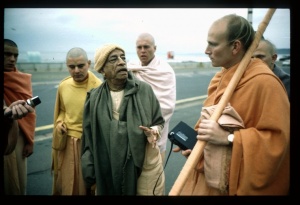CC Madhya 24.88: Difference between revisions
m (1 revision(s)) |
(Vanibot #0054 edit - transform synonyms into clickable links, which search similar occurrences) |
||
| (One intermediate revision by one other user not shown) | |||
| Line 1: | Line 1: | ||
{{ | [[Category:Sri Caitanya-caritamrta - Madhya-lila Chapter 24|C088]] | ||
<div style="float:left">'''[[Sri Caitanya-caritamrta|Śrī Caitanya-caritāmṛta]] - [[CC Madhya|Madhya-līlā]] - [[CC Madhya 24|Chapter 24: The Sixty-One Explanations of the Atmārāma Verse]]'''</div> | |||
<div style="float:right">[[File:Go-previous.png|link=CC Madhya 24.87|Madhya-līlā 24.87]] '''[[CC Madhya 24.87|Madhya-līlā 24.87]] - [[CC Madhya 24.89|Madhya-līlā 24.89]]''' [[File:Go-next.png|link=CC Madhya 24.89|Madhya-līlā 24.89]]</div> | |||
{{CompareVersions|CC|Madhya 24.88|CC 1975|CC 1996}} | |||
{{RandomImage}} | |||
==== TEXT 88 ==== | ==== TEXT 88 ==== | ||
<div | <div class="verse"> | ||
yac ca vrajanty animiṣām ṛṣabhānuvṛttyā | :yac ca vrajanty animiṣām ṛṣabhānuvṛttyā | ||
dūre-yamā hy upari naḥ spṛhaṇīya-śīlāḥ | :dūre-yamā hy upari naḥ spṛhaṇīya-śīlāḥ | ||
bhartur mithaḥ su-yaśasaḥ kathanānurāga- | :bhartur mithaḥ su-yaśasaḥ kathanānurāga- | ||
vaiklavya-bāṣpa-kalayā pulakī-kṛtāṅgāḥ | :vaiklavya-bāṣpa-kalayā pulakī-kṛtāṅgāḥ | ||
</div> | </div> | ||
| Line 14: | Line 18: | ||
==== SYNONYMS ==== | ==== SYNONYMS ==== | ||
<div | <div class="synonyms"> | ||
''[//vanipedia.org/wiki/Special:VaniSearch?s=yat&tab=syno_o&ds=1 yat]'' — which; ''[//vanipedia.org/wiki/Special:VaniSearch?s=ca&tab=syno_o&ds=1 ca]'' — also; ''[//vanipedia.org/wiki/Special:VaniSearch?s=vrajanti&tab=syno_o&ds=1 vrajanti]'' — go; ''[//vanipedia.org/wiki/Special:VaniSearch?s=animiṣām&tab=syno_o&ds=1 animiṣām]'' — of the demigods; ''[//vanipedia.org/wiki/Special:VaniSearch?s=ṛṣabha&tab=syno_o&ds=1 ṛṣabha]-[//vanipedia.org/wiki/Special:VaniSearch?s=anuvṛttyā&tab=syno_o&ds=1 anuvṛttyā]'' — by practicing the best means of spiritual life; ''[//vanipedia.org/wiki/Special:VaniSearch?s=dūre&tab=syno_o&ds=1 dūre]'' — keeping at a distance; ''[//vanipedia.org/wiki/Special:VaniSearch?s=yamāḥ&tab=syno_o&ds=1 yamāḥ]'' — the regulative principles; ''[//vanipedia.org/wiki/Special:VaniSearch?s=hi&tab=syno_o&ds=1 hi]'' — certainly; ''[//vanipedia.org/wiki/Special:VaniSearch?s=upari&tab=syno_o&ds=1 upari]'' — above; ''[//vanipedia.org/wiki/Special:VaniSearch?s=naḥ&tab=syno_o&ds=1 naḥ]'' — our; ''[//vanipedia.org/wiki/Special:VaniSearch?s=spṛhaṇīya&tab=syno_o&ds=1 spṛhaṇīya]-[//vanipedia.org/wiki/Special:VaniSearch?s=śīlāḥ&tab=syno_o&ds=1 śīlāḥ]'' — decorated with desirable qualities; ''[//vanipedia.org/wiki/Special:VaniSearch?s=bhartuḥ&tab=syno_o&ds=1 bhartuḥ]'' — of the master; ''[//vanipedia.org/wiki/Special:VaniSearch?s=mithaḥ&tab=syno_o&ds=1 mithaḥ]'' — mutually; ''[//vanipedia.org/wiki/Special:VaniSearch?s=su&tab=syno_o&ds=1 su]-[//vanipedia.org/wiki/Special:VaniSearch?s=yaśasaḥ&tab=syno_o&ds=1 yaśasaḥ]'' — who has all transcendental qualities; ''[//vanipedia.org/wiki/Special:VaniSearch?s=kathana&tab=syno_o&ds=1 kathana]-[//vanipedia.org/wiki/Special:VaniSearch?s=anurāga&tab=syno_o&ds=1 anurāga]'' — attracted to discussions; ''[//vanipedia.org/wiki/Special:VaniSearch?s=vaiklavya&tab=syno_o&ds=1 vaiklavya]'' — transformation; ''[//vanipedia.org/wiki/Special:VaniSearch?s=bāṣpa&tab=syno_o&ds=1 bāṣpa]-[//vanipedia.org/wiki/Special:VaniSearch?s=kalayā&tab=syno_o&ds=1 kalayā]'' — with tears in the eyes; ''[//vanipedia.org/wiki/Special:VaniSearch?s=pulakī&tab=syno_o&ds=1 pulakī]-[//vanipedia.org/wiki/Special:VaniSearch?s=kṛta&tab=syno_o&ds=1 kṛta]'' — jubilation; ''[//vanipedia.org/wiki/Special:VaniSearch?s=aṅgāḥ&tab=syno_o&ds=1 aṅgāḥ]'' — bodily limbs. | |||
</div> | </div> | ||
| Line 21: | Line 25: | ||
==== TRANSLATION ==== | ==== TRANSLATION ==== | ||
<div | <div class="translation"> | ||
"'Those who discuss the activities of Lord Kṛṣṇa are on the highest platform of devotional life, and they evince the symptoms of tears in the eyes and bodily jubilation. Such persons discharge devotional service to Kṛṣṇa without practicing the rules and regulations of the mystic yoga system. They possess all spiritual qualities, and they are elevated to the Vaikuṇṭha planets, which exist above us.' | |||
</div> | </div> | ||
| Line 28: | Line 32: | ||
==== PURPORT ==== | ==== PURPORT ==== | ||
<div | <div class="purport"> | ||
This is a quotation from Śrīmad-Bhāgavatam ([[SB 3.15.25]]). In this verse Lord Brahmā is speaking to all the demigods, who feared the two asuras in Diti’s womb. Lord Brahmā described the | This is a quotation from [[Srimad-Bhagavatam|''Śrīmad-Bhāgavatam'']] ([[SB 3.15.25]]). In this verse Lord Brahmā is speaking to all the demigods, who feared the two ''asuras'' in Diti’s womb. Lord Brahmā described the Kumāras' visit to Vaikuṇṭha, and this was again explained by Maitreya, the friend of Vyāsadeva, when he gave instructions to Vidura. | ||
</div> | </div> | ||
__NOTOC__ | |||
<div style="float:right; clear:both;">[[File:Go-previous.png|link=CC Madhya 24.87|Madhya-līlā 24.87]] '''[[CC Madhya 24.87|Madhya-līlā 24.87]] - [[CC Madhya 24.89|Madhya-līlā 24.89]]''' [[File:Go-next.png|link=CC Madhya 24.89|Madhya-līlā 24.89]]</div> | |||
__NOTOC__ | |||
__NOEDITSECTION__ | |||
Latest revision as of 23:11, 19 February 2024

A.C. Bhaktivedanta Swami Prabhupada
TEXT 88
- yac ca vrajanty animiṣām ṛṣabhānuvṛttyā
- dūre-yamā hy upari naḥ spṛhaṇīya-śīlāḥ
- bhartur mithaḥ su-yaśasaḥ kathanānurāga-
- vaiklavya-bāṣpa-kalayā pulakī-kṛtāṅgāḥ
SYNONYMS
yat — which; ca — also; vrajanti — go; animiṣām — of the demigods; ṛṣabha-anuvṛttyā — by practicing the best means of spiritual life; dūre — keeping at a distance; yamāḥ — the regulative principles; hi — certainly; upari — above; naḥ — our; spṛhaṇīya-śīlāḥ — decorated with desirable qualities; bhartuḥ — of the master; mithaḥ — mutually; su-yaśasaḥ — who has all transcendental qualities; kathana-anurāga — attracted to discussions; vaiklavya — transformation; bāṣpa-kalayā — with tears in the eyes; pulakī-kṛta — jubilation; aṅgāḥ — bodily limbs.
TRANSLATION
"'Those who discuss the activities of Lord Kṛṣṇa are on the highest platform of devotional life, and they evince the symptoms of tears in the eyes and bodily jubilation. Such persons discharge devotional service to Kṛṣṇa without practicing the rules and regulations of the mystic yoga system. They possess all spiritual qualities, and they are elevated to the Vaikuṇṭha planets, which exist above us.'
PURPORT
This is a quotation from Śrīmad-Bhāgavatam (SB 3.15.25). In this verse Lord Brahmā is speaking to all the demigods, who feared the two asuras in Diti’s womb. Lord Brahmā described the Kumāras' visit to Vaikuṇṭha, and this was again explained by Maitreya, the friend of Vyāsadeva, when he gave instructions to Vidura.